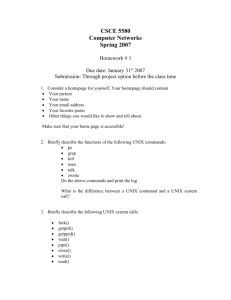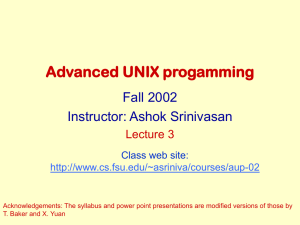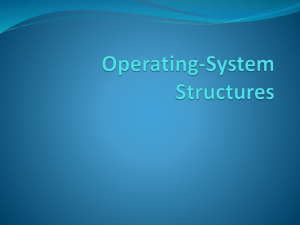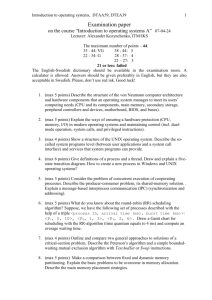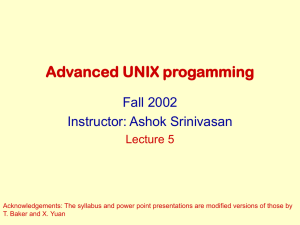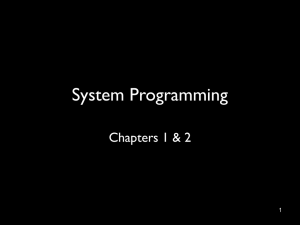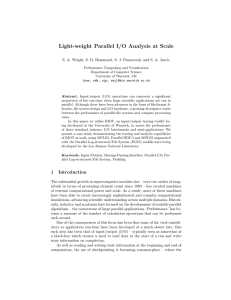Advanced UNIX progamming Fall 2002 Instructor: Ashok Srinivasan Lecture 4
advertisement
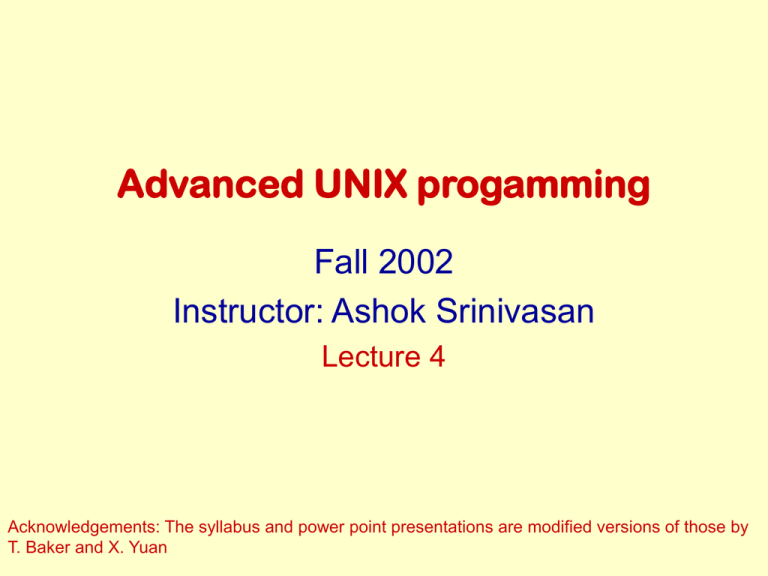
Advanced UNIX progamming Fall 2002 Instructor: Ashok Srinivasan Lecture 4 Acknowledgements: The syllabus and power point presentations are modified versions of those by T. Baker and X. Yuan Announcements • Assignment 1 announced – Due Sep 13, 2002 • Quiz next week, on week 1 & 2 topics • Reading assignment – APUE chapter 1 – APUE Chapter 2 • Pages 25-30, 44-46 Review of week 1 topics • UNIX programming environment – Editors – C compilers and debuggers – Makefiles Week 2 Topics • Review some features of C – Header files – Command line arguments – Utilities • Review some UNIX system calls – system, etc • Portability – Standards: ANSI, POSIX, etc – 32 bit vs 64 bit – Byte order: Little endian vs big endian Week 2 Topics ... continued • Introduction to the UNIX API – – – – – Environment variables Exit status Process ID User ID Signals and signal masking • UNIX file system – File system abstraction – Directories – File descriptors • Unix API Programming Examples and Techniques – Example with direct IO • open, close, etc – Variable argument list Review some features of C • • • • Header files Macros Command line arguments Utilities Header files • Usually define interfaces between separately compiled modules • May contain macro definitions, preprocessor directives, declarations of types, and function prototypes • Should not contain variable definitions or executable code Some header file errors • Improper header file use can cause problems – Try compiling example2.c – Including a header file multiple times may cause redefinition errors – Why does including stdio.h twice not cause any problem? • Look at /usr/include/stdio.h Conditional Code in Headers • Preprocessor directives are used to prevent the body of a header file from being used multiple times. #ifndef MYHEADER #define MYHEADER /* the body of the header file */ #endif Macros with and without Parameters • #define MAX_LENGTH 256 – ... for (i = 0; i < MAX_LENGTH; i++) ... • Macros can have parameters – #define max(a,b) (a > b) ? a : b • What is wrong with the following? – #define sum(a, b) a + b – #define product(a, b) a*b – See example3.c, example3b.c, example3c.c, and example3d.c Some useful functions • #include <stdio.h> • int sprintf(char *s, const char *format, ...); • int sscanf(const char *s, const char *format, ...); • How would these be used to get all the fields from the output of the shell command ps? – See example4.c Some Unix System Calls • You may use these in your first assignment – system – mkstemp system #include <stdlib.h> int system(const char *string); – Works as if string is typed into the shell at a terminal – Returns the exit status (see man page for waitpid) – Usually -1 is returned if there is an error mkstemp #include <stdlib.h> int mkstemp(char *template) – template should end in XXXXXX – It replaces XXXXXX with unique file name, and returns an open file descriptor for a file available for reading and writing Portability • Standards – Source code portability: ANSI/ISO C – UNIX standards: POSIX, open group – Internet engineering task force (IETF) • 32 bit vs 64 bit • Byte order – Little endian vs big endian Source Code Portability • Standard programming language – Example: ANSI/ISO C • ISO C90 is in use; C99 is latest - should it be used? • Standard libraries • Standard API to operating system – Example: POSIX.1 • Auto-configuration mechanisms • Programmer discipline Unix Standards • POSIX (IEEE STDS 1003.x and ISO/IEC 9945) – POSIX.1: System API for C language – POSIX.2: Shell and utilities – POSIX.5: System API for Ada language – POSIX.9: System API for Fortran language • See also http://www.pasc.org and http://www.standards.ieee.org Unix Standards ... continued • The Open Group – A consortium of vendors and user organizations – Consolidation of X/Open and the Open Software Foundation – Controls the UNIX trademark – The Austin Group combined the IEEE, TOG, and ISO standards • See also http://www.opengroup.org and http://www.opengroup.org/onlinepubs/007904 975 IETF • Internet Engineering Task Force (IETF) – Network designers, operators, vendors, researchers – Deals with the Internet – Issues RFCs • See also http://www.ietf.org 64-bit vs. 32-bit architecture • Pointers cannot be stored as int • size_t cannot be stored as int • long may not be long enough for size_t and offset_t Datatype ILP32 LP64 char 8 8 short 16 16 int 32 32 long 32 64 pointer 32 64 (long long) 64 64 Note: ILP32 and LP64 are not the only two models Byte order • Little-Endian – Low-order byte is stored at lowest address • Big-Endian – High-order byte is stored at lowest address
